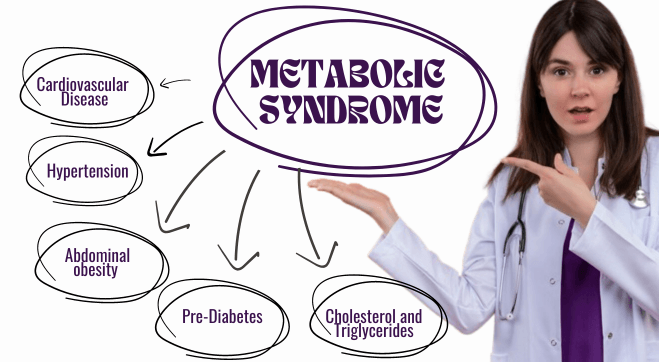Explore the complexities of metabolic syndrome, delving into its various types, symptoms, underlying causes, and available treatment options. Gain insight into this multifaceted condition that impacts overall health and well-being.
Discover how understanding metabolic syndrome can lead to more effective management and prevention strategies.
What is Metabolic Syndrome?
Metabolic syndrome is a condition where a group of factors together increase the chances of coronary heart conditions, stroke, and diabetes. In other words, a cluster of different underlying causes that affects the proper functioning of certain organs like the heart or arteries is called metabolic syndrome. This condition is also called insulin resistance syndrome.
Did you know:
Criteria for Metabolic Syndrome: Identifying the 5 Key Conditions
There are 5 criteria for metabolic syndrome. If a person suffers from any of the 3 of these conditions, they are said to have metabolic syndrome.
- Excess abdominal weight: It signifies fat accumulation in your belly region. On average, a waist size of more than 40 inches in men and 35 inches in women is considered to be excess abdominal weight. Excess abdominal weight is also a sign of obesity, which can lead to metabolic syndrome and other complications like PCOS, diabetes, etc.
- Hypertriglyceridemia: High triglyceride levels are also known as hypertriglyceridemia. Any triglyceride level from 150 mg/DL and above falls under this category.
- High Blood Sugar: High blood sugar is a metabolic syndrome criterion. Fasting sugar levels above 125 mg/DL are considered to be diabetic, whereas levels between 100 and 125 mg/DL are pre-diabetic.
- Low HDL cholesterol levels: Low good cholesterol levels can also lead to metabolic syndrome. If your HDL levels are lower than 40 mg/DL for men and 50 mg/DL for women, the person has low HDL.
- High blood pressure levels: This includes systolic and diastolic pressure. Systolic pressure above 130 mm/Hg and diastolic pressure above 85 mm/Hg are classified as high blood pressure. 4
Having any of these criteria can significantly increase your chances of Type 2 diabetes, stroke, and cardiovascular diseases. However, if you have three or more of the conditions mentioned above, it significantly increases the risk of metabolic syndrome, which calls for metabolic syndrome treatment.
What are the Symptoms of Metabolic Syndrome?
A person suffering from metabolic syndrome can experience the following symptoms:
- Larger waistline: People with metabolic syndrome are generally said to have an apple-shaped body as their abdomen bulges out due to excess fat accumulation. On the other hand, people with pear-shaped bodies have fewer chances of metabolic syndrome, owing to fat accumulation around the bum and, therefore, narrow waistlines.
- Dark skin patches: People suffering from metabolic syndrome can have dark patches in their armpits or neck.
- Frequent thirst: Metabolic syndrome symptoms also include feeling thirsty frequently or feeling dehydrated.
- Frequent urination: This syndrome makes one urinate frequently, especially at night.
- Fatigue: Metabolic syndrome can make you feel lethargic. It can also cause dizziness in some cases. 5
What are the Causes of Metabolic Syndrome?
Here are the leading causes of Metabolic Syndrome:6
- Overweight or Obesity: Excess body fat, especially around the waist, is a major cause.
- Insulin Resistance: Cells don’t respond typically to insulin, leading to high blood sugar levels.
- Sedentary Lifestyle: Lack of physical activity contributes to metabolic syndrome.
- Genetic Factors: Your genes can affect your weight and how your body responds to insulin.
- Increasing Age: The risk of metabolic syndrome increases with age.
- Unhealthy Diet: Consuming large portions of unhealthy food can raise your risk.
What Organs Are Most Affected By Metabolic Disorders?
- Heart: Metabolic syndrome significantly increases the risk of cardiovascular diseases such as coronary artery disease, heart attack, and stroke. High blood pressure, elevated cholesterol levels, and insulin resistance contribute to the development of atherosclerosis (hardening and narrowing of the arteries), which can lead to heart-related issues. 7
- Pancreas: Insulin resistance causes the pancreas to produce more insulin to regulate blood sugar levels. Over time, the pancreas may become overworked and less efficient at producing insulin, leading to type 2 diabetes. 8
- Liver: Non-alcoholic fatty liver disease (NAFLD) is strongly associated with metabolic syndrome. Excess fat accumulation in the liver can lead to inflammation and liver damage. In severe cases, NAFLD can progress to non-alcoholic steatohepatitis (NASH), cirrhosis, and liver failure. 9
- Kidneys: Metabolic syndrome can damage the kidneys by causing high blood pressure and elevated blood sugar levels. Over time, this can lead to chronic kidney disease (CKD) and an increased risk of kidney failure.
- Brain: Individuals with metabolic syndrome have a higher risk of cognitive decline, dementia, and Alzheimer’s disease. Insulin resistance and inflammation may contribute to the development of neurological conditions by damaging blood vessels and promoting the formation of beta-amyloid plaques in the brain.
- Blood vessels: Atherosclerosis, or plaque buildup in the arteries, is a common consequence of metabolic syndrome. It can restrict blood flow to vital organs, increasing the risk of heart attack, stroke, and peripheral artery disease.
- Adipose tissue (fat cells): Excess visceral fat, particularly around the abdomen, is a primary feature of metabolic syndrome. Adipose tissue produces hormones and inflammatory substances that can contribute to insulin resistance, inflammation, and cardiovascular disease. 10
- Endothelium (blood vessel lining): Metabolic syndrome damages the endothelium, the inner lining of blood vessels, leading to endothelial dysfunction. It impairs the ability of blood vessels to dilate and regulate blood flow, increasing the risk of hypertension, atherosclerosis, and cardiovascular events.
- Muscles: Insulin resistance interferes with muscle cells’ glucose uptake, causing glucose tolerance and decreased muscle function. It can contribute to reduced physical activity levels and exacerbate obesity and metabolic dysfunction.
- Intestines: Alterations in gut microbiota composition and function have been observed in individuals with metabolic syndrome. These changes can affect nutrient absorption, energy metabolism, and inflammation, potentially exacerbating metabolic dysfunction.11
Risk and Complications of Metabolic Syndrome
The following are the risk factors that increase the likelihood of metabolic syndrome: 12
- Age: Age plays a vital role in metabolic syndrome, as the chances increase with advancing age.
- Ethnicity: Inherited metabolic disorders are found in many ethnicities, like Hispanics in the USA. Hispanic women have a higher incidence of this disease. Since the exact reasons for such an occurrence are unproven, they are perhaps inherited metabolic disorders.
- Excess weight: Obesity can increase metabolic syndrome risks and complications. One must be specifically aware of abdominal obesity and weight gain, and one can reduce the chances of the same through a metabolic syndrome diet.
- High blood sugar: Diabetes can make you prone to metabolic syndrome. The incidence of metabolic syndrome is also higher among women with gestational diabetes or who have a history of Type 2 diabetes in their family.
- Other factors: Some diseases like PCOS, sleep apnea, and even non-alcoholic fatty acid disease increase your chances and risks of metabolic syndrome.
Metabolic syndrome significantly heightens the risk of some health issues, including:
- Type 2 diabetes: Without lifestyle adjustments for weight management, you might develop insulin resistance, potentially escalating to type 2 diabetes due to increased blood sugar levels.
- Cardiovascular disease: Elevated cholesterol and blood pressure levels may lead to plaque accumulation in your arteries, causing them to narrow and harden, thereby increasing the risk of heart attacks or strokes.
Diagnosis and Tests
Metabolic syndrome’s diagnostic criteria are not very straightforward. The symptoms of metabolic syndrome can be similar to those of various other diseases, which makes it tricky to detect initially. However, undergoing a master health checkup can help you detect the presence of metabolic syndrome, followed by its diagnosis.
How is metabolic syndrome diagnosed?
There are several ways to diagnose metabolic syndrome. Apart from going for a master health checkup, your healthcare professional might suggest you take a few other blood tests to detect metabolic syndrome.
Moreover, routine checkups and blood tests that measure your weight, blood pressure, blood sugar, and cholesterol can help you diagnose the disease, which, on diagnosis, will require a metabolic syndrome treatment.
Management and Treatment of Metabolic Syndrome
Once diagnosed with metabolic syndrome, your immediate step should be consulting with your doctor and starting metabolic syndrome treatment. Do you wish to know what the possible ways to treat it are? Let us discuss them below.
How is Metabolic Syndrome Treated?
There are several ways to treat metabolic syndrome. In very advanced cases, you might solely have to rely on the medications prescribed by your healthcare professional. You can also implement several lifestyle changes to reduce the chances of metabolic syndrome or reverse the condition.
The treatment of metabolic syndrome also depends on the criteria and the metabolic syndrome causes. Doctors might prescribe specific medicines to reduce each condition, such as high triglycerides, cholesterol, etc., to reduce their overall impact. Remember, there’s no single cause of metabolic syndrome, and therefore, there’s no single treatment. Instead, metabolic syndrome treatment depends on various factors and the patient’s condition.
Lifestyle Changes and Metabolic Syndrome Diets That Need to be Followed
The following are the lifestyle changes required to treat metabolic syndrome: 13
- Choose heart-healthy foods: A metabolic diet plan is crucial to reduce metabolic syndrome. This diet should include enough fruits, vegetables, and whole grains with limited sugar.
- Control your weight: You must monitor your weight constantly to reduce the impact of metabolic syndrome. Try controlling your sugar intake and avoid fast foods. Intermittent fasting can also help you keep your weight under control.
- Exercise regularly: Regular exercise can help you reduce the chances of metabolic syndrome by keeping your weight, blood sugar, and pressure levels under control. It also helps in the overall well-being of the body.
- Reduce stress: Stress can increase the chances of metabolic syndrome. Meditation can help you reduce stress and reduce the chances of this disease.
- Quit smoking: Smoking harms your lungs and causes several diseases, including metabolic syndrome. Further, avoid alcohol to keep your body healthy.
- Sleep 7-8 hours: Sleeping for at least 7 hours is crucial for your body’s well-being. It rejuvenates the organs and keeps you healthy by reducing the chances of metabolic syndrome. Remember, adequate sleep also helps relieve stress and relax your organs and muscles, lowering the chances of metabolic syndrome.
Sources
Ref Links:
- What Is Metabolic Syndrome
- Rural-urban and gender differences in metabolic syndrome
- Predictors of metabolic syndrome and its components in patients with type 2 diabetes
- Metabolic Syndrome
- METABOLIC SYNDROME Causes and Risk Factors
- Cardiovascular Consequences of Metabolic Syndrome
- Insulin Resistance and Diabetes
- Nonalcoholic fatty liver disease
- Adipose Tissue and Metabolic Health
- Gastrointestinal Disorders and Metabolic Syndrome
- Metabolic syndrome
- What Is Metabolic Syndrome & Can It Be Reversed?
- Inherited Metabolic Disorders
- Hypothyroidism and metabolic disorders








